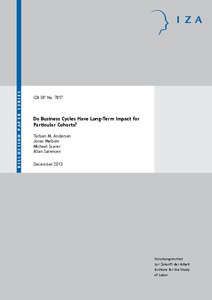Employment polarization in Spain along the cycle 1997-2012
"This article analyzes changes in the occupational employment share in Spain for the period 1997-2012 and the way particular sociodemographic adapt to those changes. There seems to be clear evidence of employment polarization between 1997 and 2012 that accelerates over the recession. Changes in...
| Main Authors: | , , |
|---|---|
| Institution: | ETUI-European Trade Union Institute |
| Format: | TEXT |
| Language: | English |
| Published: |
Bonn
2013
IZA |
| Subjects: | |
| Online Access: | https://www.labourline.org/KENTIKA-19121441124919496239-employment-polarization-in-Spa.htm |
| _version_ | 1771659896460148738 |
|---|---|
| author | Anghel, Brindusa de la Rica, Sara Lacuesta, Aitor |
| author_facet | Anghel, Brindusa de la Rica, Sara Lacuesta, Aitor |
| collection | Library items |
| description | "This article analyzes changes in the occupational employment share in Spain for the period 1997-2012 and the way particular sociodemographic adapt to those changes. There seems to be clear evidence of employment polarization between 1997 and 2012 that accelerates over the recession. Changes in the composition of the labour supply cannot explain the increase in the share of occupations at the low end of the wage distribution. Sector reallocation might have partially contributed to explain the polarization process in Spain during the years of expansion (1997-2007) but it is a minor factor during the recession. The polarization of occupations within sectors observed especially during the recession appear to be related to a decline in routine tasks which is compensated by an increase in occupations with non-routine service contents, which are found both in the low and high end of the wage distribution. Instead, jobs intensive in abstract contents do not appear to increase their share in total employment during these 15 years. The paper finds that this process has affected males more strongly than females because of their higher concentration in occupations more intensive in routine tasks. Among males, for workers under 30 years we find a decrease in the share of occupations with more routine tasks which turns into increases in others with more abstract content and particularly with more non-routine service content. Instead, male workers over 30 years seem to remain in declining occupations to a greater extent. Females of different ages are not affected by the abovementioned changes." |
| format | TEXT |
| geographic | Spain |
| id | 19121441124919496239_1afffeae0a0a457cb8d27efc7dea899e |
| institution | ETUI-European Trade Union Institute |
| is_hierarchy_id | 19121441124919496239_1afffeae0a0a457cb8d27efc7dea899e |
| is_hierarchy_title | Employment polarization in Spain along the cycle 1997-2012 |
| language | English |
| physical | 33 p. Digital |
| publishDate | 2013 |
| publisher | Bonn IZA |
| spellingShingle | Anghel, Brindusa de la Rica, Sara Lacuesta, Aitor business cycle employment labour market analysis Employment polarization in Spain along the cycle 1997-2012 |
| thumbnail | https://www.labourline.org/Image_prev.jpg?Archive=109743592792 |
| title | Employment polarization in Spain along the cycle 1997-2012 |
| topic | business cycle employment labour market analysis |
| url | https://www.labourline.org/KENTIKA-19121441124919496239-employment-polarization-in-Spa.htm |

